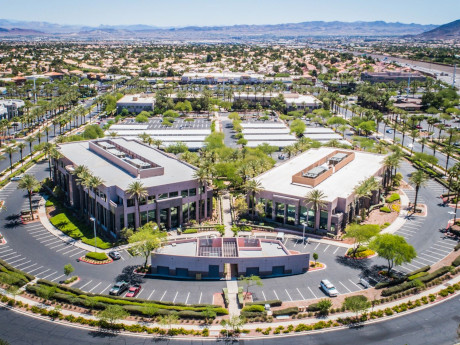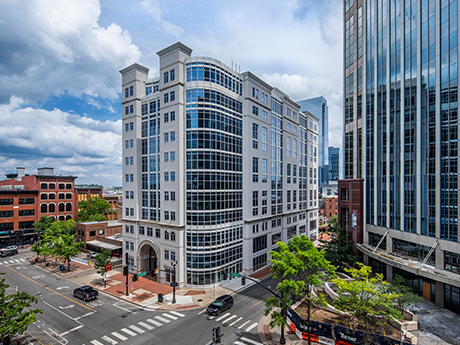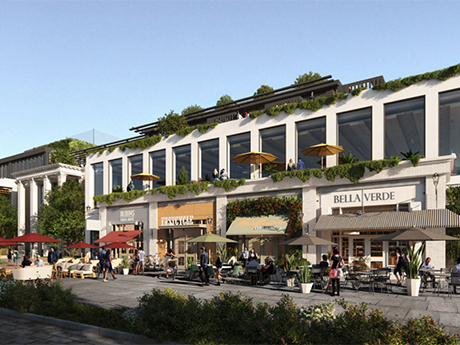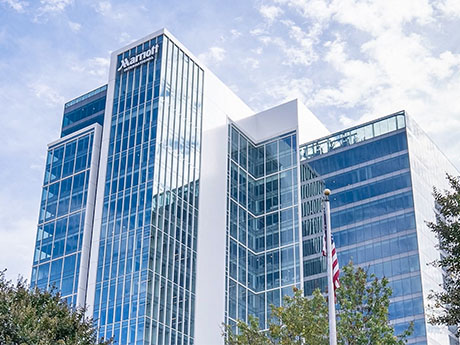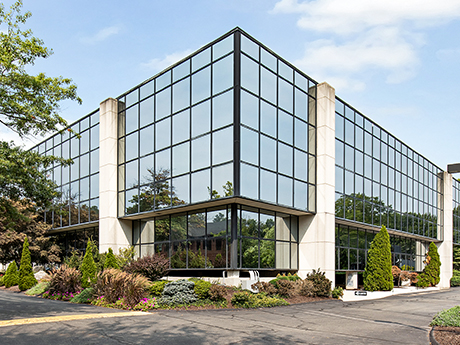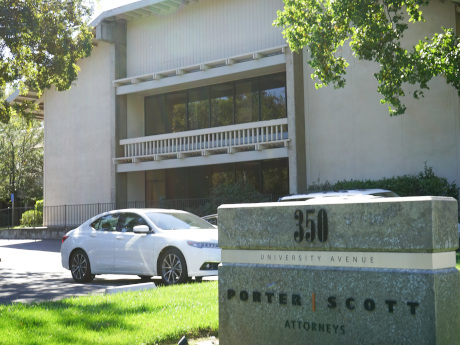HENDERSON, NEV. — Kingsbarn Realty Capital has acquired Green Valley Corporate Center, a six-building office portfolio totaling 347,015 square feet in Henderson. JMA Ventures and Blue Vista Capital Management sold the portfolio for $114.5 million. Tyler Ecklund, James Griffis, Brad Peterson, Darren Lemmon and Justin Witt of CBRE represented the seller in the deal. Green Valley Corporate Center North consists of three Class A office properties: 2275 Corporate Circle, a three-story, 68,444-square-foot building 2285 Corporate Circle, a two-story, 45,337-square-foot building 2370 Corporate Circle, a three-story, 69,208-square-foot building Green Valley Corporate Center South consists of three Class A office properties: 2475 Village View Drive, a two-story, 44,526-square-foot building 2485 Village View Drive, a three-story, 69,222-square-foot building 2495 Village View Drive, a two-story, 50,278-square-foot building
Office
OVERLAND PARK, KAN. — HNTB has signed a 25,650-square-foot office lease to relocate its Overland Park office to Aspiria. The lease commences in January. HNTB offers engineering and architecture services for infrastructure. Its recent notable projects include the Denver International Airport, the Las Vegas Raiders’ Allegiant Stadium and the Los Angeles International Airport. Locally, HNTB has worked on the University of Kansas Memorial Stadium renovation, the Buck O’Neil Bridge replacement project and the KC streetcar extension. Dina Zavislak and Charles Daggett of Savills, along with Chris Wally of Wally & Co., represented HNTB. Occidental Management owns the 207-acre Aspiria campus, which is a redevelopment of the former Sprint headquarters.
Velocis Completes $15M Renovation, Adds Tenants at Two Eleven Commerce Office Building in Downtown Nashville
by John Nelson
NASHVILLE, TENN. — Velocis, a private equity real estate investment management firm, has recently completed the $15 million renovation of Two Eleven Commerce, a 233,341-square-foot office building located at 211 Commerce St. in downtown Nashville. Velocis purchased the 11-story office tower in spring 2020 with Lincoln Property Co., the third joint venture between the two Dallas-based firms. Built in 2000, the office building’s renovations include a two-story lobby with a new glass entry portal, contemporary conference center, integrated tenant lounge with indoor/outdoor seating, onsite catering kitchen and a fitness center with full locker rooms and showers. Other improvements throughout the office tower include upgraded and modernized elevators and elevator bays, exterior paint, new windows and a new gateless entry parking system in the building garage. Additionally, two new tenants are joining Two Eleven Commerce. Recruiting firm IQTalent leased the top three floors (67,000 square feet) and will have building signage, and burger chain Black Tap Craft Burgers & Beer is opening a restaurant on the ground level in spring 2023. Sarah Pettigrew, Bill Adair and Ashley Marshall of JLL are the leasing agents at Two Eleven Commerce. About 90,000 square feet is currently available at the office building, including about …
Affordable HousingDevelopmentMixed-UseMultifamilyNew JerseyNortheastOfficeRetailSeniors HousingTop Stories
HBC, Streetworks Unveil Plans for 731,000 SF Mixed-Use Redevelopment Project in Westfield, New Jersey
by Katie Sloan
WESTFIELD, N.J. — A partnership between Hudson Bay Co. (HBC) and StreetWorks Development, the company’s property development division, has unveiled plans for a mixed-use redevelopment project in Westfield, roughly 22 miles west of New York City. The developer plans to convert a 731,000-square-foot building previously occupied by a Lord & Taylor department store, as well as several town-owned parcels, into One Westfield Place, a transit-served development with an array of uses and pedestrian features. Preliminary plans call for 310,000 square feet of office space across two buildings; 27,000 square feet of retail and restaurant space throughout the development; 154 age-restricted apartments and townhomes; 69 market-rate apartments; an unspecified amount of affordable housing in accordance with local and state requirements; and two parking garages that can accommodate over 450 cars. The development team also plans to revitalize the downtown area with pocket parks, event spaces, water features and a mobility hub connecting the two sides of the train station that offers storage, bike stations and ride sharing areas. The joint venture will collaborate with Dan Biederman — president of Biederman Redevelopment Ventures, which runs the programs in New York City’s Bryant Park — to develop a plan to strategically program events and …
CALABASAS, CALIF. — While the widespread adoption of the hybrid work-from-home model resulting from the COVID-19 pandemic is having a dampening effect on demand for office space, it also is proving to have a positive impact on certain segments of retail. Those were some of the key takeaways from a webcast hosted by Marcus & Millichap that featured Dr. Lawrence Summers, former secretary of the U.S. Department of the Treasury, who offered his insights on timely commercial real estate issues and the near-term outlook for the U.S. economy. Moderated by Marcus & Millichap CEO Hessam Nadji on Tuesday, Sept. 13, other featured speakers during the hour-long webcast included Conor Flynn, CEO of Kimco Realty Corp. (NYSE: KIM), and Swarup Katuri, managing partner at Brookfield Asset Management. The webinar, which was geared toward current and prospective investors in commercial real estate, attracted several thousand viewers, according to Marcus & Millichap, which is headquartered in Calabasas. “I think the sign is clear: Nobody is going to be going into the office more than they were before [the pandemic], and a lot of people are going to be going in less. Less because there’s going to be more flexibility, less because there’s some …
Marriott Opens New Corporate Headquarters and Flagship Hotel in Downtown Bethesda, Maryland
by John Nelson
BETHESDA, MD. — Marriott International has opened its new global headquarters campus in downtown Bethesda. The hotel giant’s home base is a 21-story, 785,000-square-foot office tower that houses around 3,500 Marriott employees working from 2,842 workspaces (including offices, workstations and flexible spaces). The LEED Gold-certified tower had a six-year construction timeline, according to Marriott. The design-build team includes architectural firm Gensler and general contractors Hensel Phelps and Rand Construction. The Bernstein Cos. and Boston Properties jointly own Marriott’s campus. In addition to the office tower, Marriott’s corporate campus includes the new Marriott Bethesda Downtown at Marriott HQ hotel next door that also serves as Marriott’s testing ground for new concepts, design elements, service approaches and amenities via 13 model hotel rooms. Within the office tower, Marriott operates an 8,400-square-foot lab, as well as a test kitchen and bar for research-and-development purposes. Each office within the tower has views from the floor-to-ceiling windows, and all desks are equipped with sit-stand optionality and ergonomic chairs. The tower includes 180 meeting and collaboration areas, as well as an “associate growth center” on the top floor that offers staffers access to leadership development programs, skill development curriculum, guest speakers, new hire orientation and networking …
DARIEN, CONN. — CBRE has brokered the $21.1 million sale of a 70,928-square-foot office building located at 9 Old Kings Highway S. in the southern coastal Connecticut city of Darien. The transit-served property is located in the city’s downtown area and was 84 percent leased at the time of sale. Jeffrey Dunne, Steve Bardsley, David Gavin, Jeremy Neuer and Travis Langer of CBRE represented the seller, Hall Investments, in the transaction. The buyer was not disclosed.
KANSAS CITY, MO. — Blue Cross and Blue Shield of Kansas City is relocating its headquarters from 2301 Main St. to 1400 Baltimore Ave. in Kansas City. The company signed a long-term lease for 260,000 square feet. Bryan Johnson, Tom Volini and Sven Sykes of Colliers Kansas City represented the tenant in the lease transaction. The landlord was undisclosed.
NEW YORK CITY — Carlyle has signed a 40,542-square-foot office lease at 340 Madison Avenue in Midtown Manhattan. The global investment and financial services firm has leased the entire eighth floor of the 745,312-square-foot building, which was originally constructed in 1928, for 10 years. Steve Rotter and Joe Messina of JLL represented the tenant in the lease negotiations. Paul Glickman, Matthew Astrachan, Cynthia Wasserberger and Dan Turkewitz, also with JLL, represented the landlord, RXR.
Cushman & Wakefield Negotiates $9M Sale of Executive Commons Office Property in Sacramento
by Amy Works
SACRAMENTO, CALIF. — Cushman & Wakefield has arranged the off-market sale of Executive Commons, a two-story office building in Sacramento. 350 University Partnership sold the asset to Sacramento-based Bardis & Miry Development for $9 million. Located at 350 University Ave., the property features 47,000 square feet of multi-tenant office space. At the time of sale, the building was 95 percent leased. Kevin Partington and Ben Corfee of Cushman & Wakefield represented the seller in the transaction.


